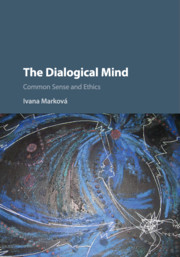Book contents
- The Dialogical Mind
- The Dialogical Mind
- Copyright page
- Dedication
- Epigraph
- Contents
- Figures
- Preface and acknowledgements
- Introduction
- Part I ‘Superior’ and ‘inferior’ thinking and knowing
- 1 From mythos and irrationality towards logos and rationality
- 2 Towards Giambattista Vico’s common sense
- 3 Common sense in humanities and social sciences
- Conclusion to Part I
- Part II Dialogicality as epistemology of daily life and of professional practices
- References
- Index
1 - From mythos and irrationality towards logos and rationality
from Part I - ‘Superior’ and ‘inferior’ thinking and knowing
Published online by Cambridge University Press: 05 August 2016
- The Dialogical Mind
- The Dialogical Mind
- Copyright page
- Dedication
- Epigraph
- Contents
- Figures
- Preface and acknowledgements
- Introduction
- Part I ‘Superior’ and ‘inferior’ thinking and knowing
- 1 From mythos and irrationality towards logos and rationality
- 2 Towards Giambattista Vico’s common sense
- 3 Common sense in humanities and social sciences
- Conclusion to Part I
- Part II Dialogicality as epistemology of daily life and of professional practices
- References
- Index
Summary
Throughout this chapter I referred to attempts to separate, in different historical and cultural periods,'inferior' and 'superior' thinking and knowing, and to difficulties in maintaining such a separation. Some scholars, like Aristotle and Jacob argued that scientific and mythical reasoning fulfil, at least to some degree, similar functions: they both aim at explaining fundamental questions about the universe,the origin of matter and life; and they are both based on imagination, representations of the world, and they explore powers that rule it.
Although the categories of mythos and logos have created controversies since ancient Greece, they have been maintained throughout centuries together with the conviction that on its road towards progress humankind will shed off irrational beliefs and myths. However, today, the mixture of myth and science still characterizes the thinking of ordinary citizens, scientific popularisers and political ideologists. It may even permeate thinking of scientists who, whether with or without awareness, are prone to propagating ‘scientific myths’. But search for coherence takes different paths; for scientists like Einstein or Wiener, boundaries between different kinds of knowing like science, religion, ethics and aesthetics were not rigid, but totally fluid and open towards creative and imaginative thought.
- Type
- Chapter
- Information
- The Dialogical MindCommon Sense and Ethics, pp. 15 - 38Publisher: Cambridge University PressPrint publication year: 2016

